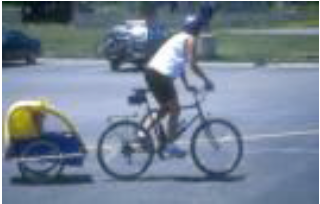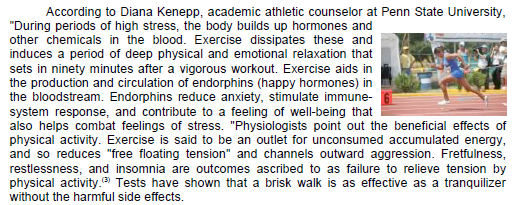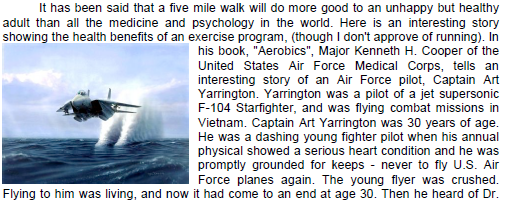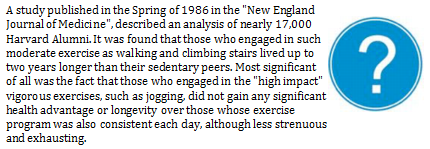EXERCISE IS FOR EVERY BODY

In the biological world purposeful movement is life: inactivity is death. Action is a law of our being, and body functions must be kept going. More people rust out than wear out. The medical practice has been slow in recognizing this fact.
Early in this century if a woman went to the hospital to have her baby, she would probably be kept there for four weeks; today, a mother is permitted to walk off the delivery table if she wants to. In fact, she is encouraged to walk right after delivery.
Physicians are now prescribing exercise as part of the program for speeding up the recovery of surgical and maternity patients, thus preventing blood clotting, kidney stones and loss of calcium from the bones of bed patients.
While muscular work greatly strengthens physical power (there are 633 muscles in the body), man's inventions have left little need for the use of muscle. Most of our country's labor is done by machines that are kept in running order by a few experts. The large muscles of the body are little used after childhood and early adolescence. One hundred years ago it was real work to just take a bath. You had to take the buckets outside to the hand pump to pump the water, then you had to heat the water on the stove (that needs more wood to keep it going), and then pour it into the tub. Of course, after the bath you had to empty the large tub, bucket by bucket. What a lot of work just to take a bath!
WHAT DOES EXERCISE REALLY DO FOR YOU?
EXERCISE reduces the risk of heart disease.
EXERCISE increases efficiency of your lungs and help those with asthma.
EXERCISE helps arthritis.
EXERCISE helps those who are obese.
EXERCISE improves varicose veins.
EXERCISE helps prevent certain types of cancer in women.
EXERCISE will help osteoporosis.
EXERCISE helps relieve stress and anxiety.
EXERCISE REDUCES THE RISK OF HEART DISEASE
Exercise will improve the tone of your muscles and blood vessels, changing them from weak and flabby tissue to strong and firm tissue. Exercise will increase the efficiency of your heart in several ways. gradually the heart will grow stronger and pump more blood with each stroke, which will reduce the number of strokes needed to supply your body with life giving blood, thus lowering your pulse.
If you are a sedentary person, your heart beats 70 to 80 times a minute at rest, and pumps out two to three ounces of blood with each beat. If it is accustomed to exercise, its larger size and stronger contractions can pump as much blood in 60 beats as the shallow stroke of the unconditioned heart does with 80 beats. A saving of 20 beats a minute means a saving of 1,200 beats an hour or 29,000 beats a day.
"Those who don't exercise have twice the risk of developing heart disease than those who exercise regularly," says Carl Caspersen, Ph.D. M.P.H., exercise epidemiologist for the Center of Disease Control in Atlanta. Exercise increases the amount of blood pumped per heart beat as well as the amount of blood that circulates in the body. "The exercised heart is thus more efficient, transferring more oxygen to the body's cells more easily", explains Dr. Caspersen. Consider the amount of work the average heart does every 24 hour period. It will beat over 100,000 times and it pumps around 4,000 gallons of blood. The average pulse or heart rate is 70 - 80 beats per minute. Athletes can have a heart rate down to 35 or 40 beats a minute. A woman's heart beat is generally higher than a man's. Children and babies have still higher rates, from 80-150 beats per minute.

In a study of 55,000 men ranging from 25 to 64 years of age who were enrolled in the Health Insurance Plan of Greater New York, it was shown that heart attacks, when they occurred, were more likely to be lethal in sedentary men than in active men.
Exercise will also increase the size and number of your blood vessels, thus helping to lower your blood pressure; and studies have shown that regular exercise can reduce blood cholesterol levels.
EXERCISE WILL INCREASE THE EFFICIENCY OF YOUR LUNGS AND HELP THOSE WITH ASTHMA

Asthmatics should be encouraged to have a program of regular physical exercise. Brief exercise periods of from one to two minutes can actually open up constricted lungs according to a report from the Committee on Rehabilitation Therapy of the American Academy of Allergy.
EXERCISE HELPS ARTHRITIS
Arthritics can exercise! An ongoing five-year study at the University of Missouri, Columbia Multi-purpose Arthritis Center, is looking at the effects of aerobic exercise on people with either rheumatoid arthritis or osteoarthritis. The majority of those participating in the 12 week exercise programs have shown improved aerobic capacity and reported that they felt less pain and stiffness from their arthritis.(1)
EXERCISE HELPS THOSE WHO ARE OBESE
Sixty two percent of the people in this country are overweight and the percentage is still rising. Why? Two major reasons are too much of the wrong kinds of food and not enough exercise. A person who is fifty pounds overweight is like an individual with a fifty pound sack of cement on his back. Can you imagine someone carrying a fifty pound sack of cement on his back all day long? It would sap your energy! This is one reason you will rarely see a person who is considerably overweight going for long walks or being very active; for it is a chore just for them to get up from the sofa.
Obesity is simply caused by eating more fatty and energy foods than the body can use in its energy program, and the body stores the excess food as fat. A mild exercise program for those who are considerably overweight and a vigorous one for those who are slightly overweight will help the body to use up more of that energy so that it cannot be stored as body fat.
When exercising you are taking in more oxygen; and oxygen burns up more fat and waste matter in the body helping you to lose weight. That is one reason why it is important to exercise outside in the fresh air where there is a higher percentage of oxygen. Exercise also helps to regulate the appestat, which is located in the brain and controls appetite and food intake. This is one of the reasons that a person who exercises regularly will eat less.
EXERCISE IMPROVES VARICOSE VEINS
Several things contribute to varicose veins. One is occupational, where a person has to stand on his/her feet a large percentage of the time; another is constipation; and the third is a lack of exercise, especially the feet. Severe varicose veins cannot be cured, but they can be helped. A simple exercise which is excellent for varicose veins is to stand on the floor with your hands at your side, then go up on your toes and lift your hands and try to touch the ceiling. This exercise is to be repeated constantly for five minutes and should be done morning, noon, and evening and before going to bed at night.
EXERCISE HELPS PREVENT CERTAIN TYPES OF CANCER IN WOMEN
"Studies show that inactive women have a two and a half times greater risk of developing cancer of the reproductive system and almost twice the chance of developing breast cancer as those who do exercise," says Rose E. Frisch, Ph.D., associate professor at the Harvard School of Public Health in Boston. The reason, Scientists hypothesize that the lower body fat of long-term exercisers results in decreased estrogen production as well as less potent estrogen than is found in non exercisers. This in turn causes cells in the breasts and uterus to divide less frequently, decreasing the chance of tumor formation.
EXERCISE WILL HELP OSTEOPOROSIS
Exercise will help osteoporosis. Bone is living, dynamic tissue composed of a meshwork of gelatinous protein called collagen (from which gelatin can be made) in which the mineral salts of calcium, phosphorus and magnesium are held.(2) If you want your bones to be dense and strong, you must continue to be active. Inactivity causes bones to lose minerals and become weak, causing osteoporosis. Astronauts on space flights lose minerals but as soon as their mission ends and they begin to exercise again, the loss is restored. This restoration however does not equal the amount lost.
EXERCISE HELPS RELIEVE STRESS AND ANXIETY


Cooper's reconditioning program and came to him for help. After Dr. Cooper had finished his tests, he gave Art only a chance in a mil ion to recover his flying status. But Art grasped at even that infinitesimal straw. So Dr. Cooper put him on a program. The first requirement was to stop smoking. He did. Then he was started on a supervised walking program with gradual progression to running. He was a young man of almost unbelievable motivation.
Back at his base doing ground duty, he followed the program Dr. Cooper prescribed. This was in May. By July he was running three miles a day averaging nearly a mile in eight minutes; by August, it was four miles; by September, five miles in forty minutes; by October, six miles in 46 minutes. About this time he came back to Dr. Cooper for another checkup and was given the severest kind of endurance test. He broke every previous record on the treadmill . Dr. Cooper says he was in the best physical condition of any man he had ever examined. He kept running until he could do 25 miles in just short of 2 hours. Two years after his dismissal from the Air Force, his adamantly final disqualification was reversed; and he returned to flying status for combat duty in Vietnam. Exercise will improve the overall condition of your body; it will slow down the aging process and give you new zest for living.
WHAT TYPE OF EXERCISE IS BEST?
Walking outdoors in the fresh air and sunshine is the simplest and best exercise one can do. One should avoid jumping and pounding activities. Low impact exercise such as walking, cycling or hiking is more beneficial than are the high impact exercises such as jogging, basketball , weight lifting, etc.

Mounting scientific data suggests that jogging and other strenuous exercise might not be worth the effort if the only reason people are doing it is to prolong their lives. The consistent finding from several recent major studies involving thousands of people and lasting many years - is that regular brisk walks or other moderate exercise is enough to achieve significant health benefits. Kenneth E. Powell of the Federal Centers for Disease Control said that experts used to think that intense physical activity was necessary to achieve health benefits, but now it is clear that substantial gains can come from moderate exercise. Those who can benefit the most are sedentary men.
Three years ago, Ralph Paffenbarger Jr. of Stanford University presented the results of his now famous Harvard University alumni study, which tracked the longevity and lifestyle of almost 17,000 graduates who entered Harvard between 1916 and 1950. The conclusion was that inactive alumni were much more likely to die prematurely than their more active classmates. Even mild exercise, such as walking a total of 9 miles a week, offered substantial protection.









